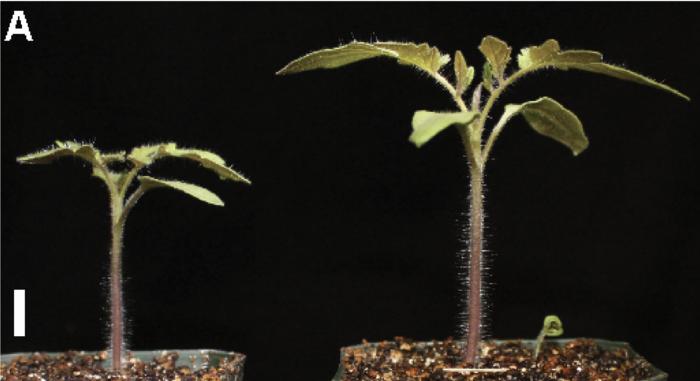Exposing seedlings to ethylene in darkness increases size and vigor, in a finding with implications for agriculture. Farmers have worked to increase crop yields for millennia, and the quest remains urgent as the human population continues to grow. Increases in yield often come at a price, however: reductions in stress tolerance. Brad Binder and colleagues sought to increase plant yield without sacrificing hardiness by using to the gaseous plant growth hormone ethylene. Previous work established that seedlings grown in the dark and treated with ethylene show reduced growth and a distinctive hooked shape. However, the authors found that when seedlings treated with ethylene in the dark for several days were subsequently given light (and had the ethylene treatment discontinued), the seedlings did better than controls, showing longer primary and lateral roots, a higher density of lateral roots, and an increase in aerial tissue fresh weight. The pattern was first observed in Arabidopsis thaliana, a mustard relative used as a model plant. Similar patterns were subsequently observed in tomato, cucumber, and wheat. Adding sugars to the treatment given in the dark increased the effect, suggesting that the ethylene treatment helps the plant ramp up its metabolism in preparation for emergence from the soil into the sunlight. A metabolomics analysis and RNA sequencing analyses supported this interpretation. In addition, experiments showed that plants treated with ethylene during darkness were more tolerant of extreme heat, salty soil, and low oxygen levels than controls. The results suggest that ethylene treatments could help improve yields across a range of crops without sacrificing stress tolerance, according to the authors.

Credit: Brenya et al.
Exposing seedlings to ethylene in darkness increases size and vigor, in a finding with implications for agriculture. Farmers have worked to increase crop yields for millennia, and the quest remains urgent as the human population continues to grow. Increases in yield often come at a price, however: reductions in stress tolerance. Brad Binder and colleagues sought to increase plant yield without sacrificing hardiness by using to the gaseous plant growth hormone ethylene. Previous work established that seedlings grown in the dark and treated with ethylene show reduced growth and a distinctive hooked shape. However, the authors found that when seedlings treated with ethylene in the dark for several days were subsequently given light (and had the ethylene treatment discontinued), the seedlings did better than controls, showing longer primary and lateral roots, a higher density of lateral roots, and an increase in aerial tissue fresh weight. The pattern was first observed in Arabidopsis thaliana, a mustard relative used as a model plant. Similar patterns were subsequently observed in tomato, cucumber, and wheat. Adding sugars to the treatment given in the dark increased the effect, suggesting that the ethylene treatment helps the plant ramp up its metabolism in preparation for emergence from the soil into the sunlight. A metabolomics analysis and RNA sequencing analyses supported this interpretation. In addition, experiments showed that plants treated with ethylene during darkness were more tolerant of extreme heat, salty soil, and low oxygen levels than controls. The results suggest that ethylene treatments could help improve yields across a range of crops without sacrificing stress tolerance, according to the authors.
Journal
PNAS Nexus
DOI
10.1093/pnasnexus/pgad216
Article Title
Ethylene-mediated metabolic priming increases photosynthesis and metabolism to enhance plant growth and stress tolerance
Article Publication Date
18-Jul-2023



